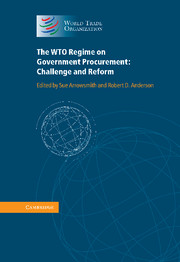Book contents
- Frontmatter
- Contents
- List of contributors
- Foreword by Pascal Lamy
- Perspective of the Chairman of the WTO Committee on Government Procurement, Nicholas Niggli (Switzerland)
- Preface
- Disclaimer
- PART I The WTO regime on government procurement
- PART II Expanding the scope of the Agreement on Government Procurement: accession and coverage
- PART III Revision of the procedural rules and other transparency provisions of the Agreement on Government Procurement
- PART IV Developing countries in the WTO procurement regime
- PART V Economic and social development (horizontal policies) in government procurement
- PART VI Enforcement and remedies
- PART VII Multilateralism and regionalism
- PART VIII Challenges and new directions
- 22 Ensuring integrity and competition in public procurement markets: a dual challenge for good governance
- 23 Developing multilateral rules on government procurement: the value of soft law
- 24 Work of UNCITRAL on government procurement: purpose, objectives and complementarity with the work of the WTO
- 25 Global procurement law in times of crisis: new Buy American policies and options in the WTO legal system
- 26 Procurement in times of crisis: lessons from US government procurement in three episodes of ‘crisis’ in the twenty-first century
- Index
- References
26 - Procurement in times of crisis: lessons from US government procurement in three episodes of ‘crisis’ in the twenty-first century
from PART VIII - Challenges and new directions
Published online by Cambridge University Press: 07 September 2011
- Frontmatter
- Contents
- List of contributors
- Foreword by Pascal Lamy
- Perspective of the Chairman of the WTO Committee on Government Procurement, Nicholas Niggli (Switzerland)
- Preface
- Disclaimer
- PART I The WTO regime on government procurement
- PART II Expanding the scope of the Agreement on Government Procurement: accession and coverage
- PART III Revision of the procedural rules and other transparency provisions of the Agreement on Government Procurement
- PART IV Developing countries in the WTO procurement regime
- PART V Economic and social development (horizontal policies) in government procurement
- PART VI Enforcement and remedies
- PART VII Multilateralism and regionalism
- PART VIII Challenges and new directions
- 22 Ensuring integrity and competition in public procurement markets: a dual challenge for good governance
- 23 Developing multilateral rules on government procurement: the value of soft law
- 24 Work of UNCITRAL on government procurement: purpose, objectives and complementarity with the work of the WTO
- 25 Global procurement law in times of crisis: new Buy American policies and options in the WTO legal system
- 26 Procurement in times of crisis: lessons from US government procurement in three episodes of ‘crisis’ in the twenty-first century
- Index
- References
Summary
‘You never want a serious crisis to go to waste.’
Rahm Emanuel, White House Chief of Staff, to President Barack Obama, 21 November 2008Introduction
The notion – which now approaches the status of conventional wisdom – that policy breakthroughs can be achieved in times of crisis, finds an academic echo in the common-sense idea that something particularly useful can be learned about a significant socio-economic phenomenon, such as government procurement, by studying its performance in times of crisis. Indeed, that insight drives both this chapter and the previous one. This chapter proceeds by examining and comparing the lessons that emerge – or which are believed to emerge – from three recent episodes of political or economic crisis in the US, each of which had significant consequences for the procurement system of the US national (‘federal’) government. The three episodes examined are: (i) the procurement response to Hurricane Katrina, which struck the Gulf Coast of the US in the summer of 2005; (ii) the procurement issues that emerged in response to the attacks of 11 September 2001 and the ensuing US military engagements in Iraq and in Afghanistan; and (iii) the procurement aspects of the federal government's stimulus response to the current ‘Great Recession’.
This contribution is not offered as a piece of primary empirical research but as a vehicle for meta-analysis. There are several reasons for choosing this approach. First, with respect to some of these crisis episodes, the primary work has already been done elsewhere.
- Type
- Chapter
- Information
- The WTO Regime on Government ProcurementChallenge and Reform, pp. 803 - 829Publisher: Cambridge University PressPrint publication year: 2011
References
- 1
- Cited by



